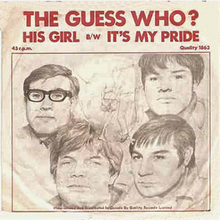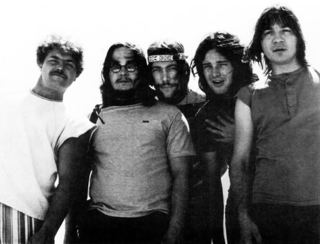
The Guess Who are a Canadian rock band formed in Winnipeg, Manitoba, in 1965. The band originated in 1962 and achieved an international hit single with a recording of "Shakin' All Over" in 1965 under the name Chad Allan and the Expressions. After changing their name to The Guess Who, they found their greatest success in the late 60s and early 70s, under the leadership of singer/keyboardist Burton Cummings and guitarist Randy Bachman, with hit songs including "American Woman", "These Eyes", and "No Time".

"Maggie May" is a song co-written by singer Rod Stewart and Martin Quittenton, and performed by Rod Stewart on his album Every Picture Tells a Story, released in 1971.
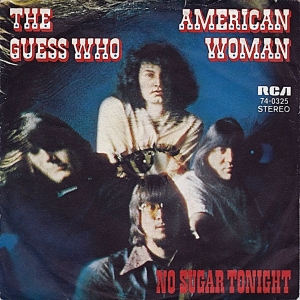
"American Woman" is a song by Canadian rock band the Guess Who, released January 1970, from the album of the same name. It was later released in March 1970 as a single backed with "No Sugar Tonight", and it reached number one for three weeks commencing May 9 on both the United States' Billboard Hot 100 and the Canadian RPM magazine singles chart. Billboard magazine placed the single at number three on the Year-End Hot 100 singles of 1970 list, and it was listed as number five for 1970 on the RPM Year-End Chart. On May 22, 1970, the single was certified as gold by the Recording Industry Association of America (RIAA). It also reached the top ten in the Netherlands, Switzerland and Austria, and the top twenty in the United Kingdom and New Zealand.

"Shakin' All Over" is a song originally performed by Johnny Kidd & the Pirates. It was written by leader Johnny Kidd, and his original recording reached No. 1 on the UK Singles Chart in August 1960. The song is sometimes credited to Frederick Albert Heath, which is Kidd's real name. Kidd's recording was not a hit outside Europe. In other parts of the world the song is better known by recordings from other artists.

"Valleri" is a song written by Tommy Boyce and Bobby Hart for the Monkees. The single reached #3 on the Billboard Hot 100 and spent two weeks at #1 on the Cash Box chart in early 1968. The song also rose to #1 in Canada and #12 in the UK.

"Piece of My Heart" is a romantic soul song written by Jerry Ragovoy and Bert Berns, originally recorded by Erma Franklin in 1967. Franklin's single peaked in December 1967 at number 10 on the Billboard Hot Rhythm & Blues Singles chart in the United States.
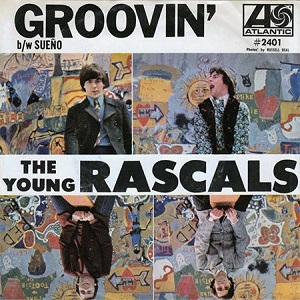
"Groovin'" is a song written by American singer songwriters Felix Cavaliere and Eddie Brigati, initially recorded by their group the Young Rascals in 1967. Cavaliere was inspired to compose the song by his girlfriend Adrienne Buccheri, whom he only got to meet every Sunday amidst heavy touring and recording. Musically, the song differs from most of band's previous output, leaving the garage rock genre for Latin American influences, such as baião. Lyrically, "Groovin'" tells the tale of a narrator spending time with his partner on a Sunday afternoon. The song was arranged and recorded at the Talentmasters Studios, New York City in March of 1967.
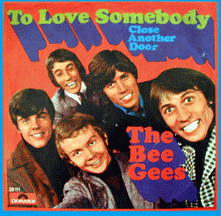
"To Love Somebody" is a song written by Barry and Robin Gibb. Produced by Robert Stigwood, it was the second single released by the Bee Gees from their international debut album, Bee Gees 1st, in 1967. The single reached No. 17 in the United States and No. 41 in the United Kingdom. The song's B-side was "Close Another Door". The single was reissued in 1980 on RSO Records with "How Can You Mend a Broken Heart" as its flipside. The song ranked at number 94 on NME magazine's "100 Best Tracks of the Sixties". It was a minor hit in the UK and France. It reached the top 20 in the US. It reached the top 10 in Canada.

"These Eyes" is a song by the Canadian rock band The Guess Who. The song was co-written by the group's lead guitarist Randy Bachman and lead singer Burton Cummings and originally included on the band's 1969 album Wheatfield Soul. It was first released as a single, in their native Canada, where its chart success (#7), along with the influence of CKLW-AM Windsor's radio station music director Rosalie Trombley, helped land them a U.S. distribution deal with RCA Records. It was then released in the U.S. in March 1969, and became a breakthrough success for the group, as it would be their first single to reach the top ten on the Billboard Pop Singles chart, peaking at number six, and would eventually be certified gold by the RIAA for sales of over one million copies. It was also a top ten hit in South Africa. While it was actually the 18th single released by the band overall, it was the first from the line-up of Cummings, Bachman, Jim Kale, and Garry Peterson as produced by Jack Richardson.

"Georgy Girl" is a song by the Australian pop/folk music group The Seekers. It was used as the title song for the 1966 film of the same title. Tom Springfield, who had written "I'll Never Find Another You", composed the music and Jim Dale supplied the lyrics. The song is heard at both the beginning and end of the film, with markedly different lyrics. It was nominated for an Academy Award for Best Original Song but the prize went to "Born Free".

"Runnin' Back to Saskatoon" is a song written by Burton Cummings and Kurt Winter.
"Sweet Pea" is a song written and performed by Tommy Roe. The song was produced by Gary S. Paxton. It was featured on his 1966 album, Sweet Pea.
"Hey Ho, What You Do to Me" is a song written by Nickolas Ashford, Valerie Simpson, and Jo Armstead and performed by Chad Allan and the Expressions. It reached #3 in Canada in 1965. The song was released in the United States in August of that same year and reached #125 on the Billboard chart. It was featured on their 1965 album, Hey Ho

"Believe Me" is a song written by Randy Bachman and performed by The Guess Who. It reached #10 in Canada in 1966. The song was released in the United States as a single, but it did not chart. It was featured on their 1966 album, It's Time.
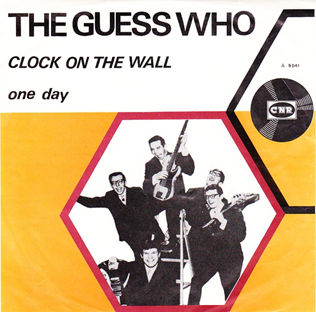
"Clock on the Wall" is a song written by Randy Bachman and performed by the Guess Who. It reached number 16 in Canada in 1966. The song was released in the United States as a single, but it did not chart. It was featured on their 1966 album, It's Time.

"Share the Land" is a song written by Burton Cummings and performed by The Guess Who. It reached #2 in Canada, #10 on the Billboard Hot 100, and #63 in Australia in 1970. The song was also released in the United Kingdom as a single, but it did not chart. The song is featured on their 1970 album, Share the Land.
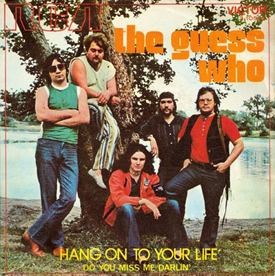
"Hang On to Your Life" is a song written by Burton Cummings and Kurt Winter and performed by The Guess Who. The song is featured on their 1970 album, Share the Land. The producer was Jack Richardson and the arrangement was by The Guess Who. On the 8-track tape edition of Share the Land, the song was edited to make it a bit longer in order to fill out the timing on the first channel.

"Albert Flasher" is a song written by Burton Cummings and performed by Canadian rock band The Guess Who. Initially released as the B-side of their "Broken" single in 1971, it was promoted to A-side status in mid-May of that year, according to the Billboard Hot 100 chart. It did not appear on any of their studio albums at that time, although it would much later be included on reissues of the band's 1971 album So Long, Bannatyne. It would also appear on many of their later compilation albums, including the 1973 release The Best of The Guess Who Volume II and the 1973 compilation EP titled The Guess Who. It was also performed many times in concert, including the performance captured on Live at the Paramount (1972).
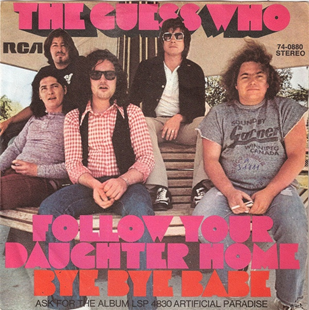
"Follow Your Daughter Home" is a song written by Burton Cummings, Donnie McDougall, Garry Peterson, Bill Wallace, and Kurt Winter and performed by The Guess Who. It reached #20 in Canada and #61 on the Billboard Hot 100 in 1973. The song was also released in the United Kingdom as a single, but it did not chart. The song was featured on their 1973 album, Artificial Paradise. The song has a calypso-influenced melody.

"Dancin' Fool" is a song written by Burton Cummings and Domenic Troiano and performed by The Guess Who. The song was featured on their 1974 album, Flavours. The song was produced by Jack Richardson.
